 Before the Coffee Gets Cold (Before the Coffee Gets Cold, #1) by Toshikazu Kawaguchi
Before the Coffee Gets Cold (Before the Coffee Gets Cold, #1) by Toshikazu Kawaguchi Narrator: Geoffrey Trousselot
Format: ebook
Source: purchased from Amazon
Formats available: hardcover, paperback, ebook, audiobook
Genres: fantasy, magical realism, relationship fiction, time travel
Series: Before the Coffee Gets Cold #1
Pages: 272
Published by Picador on September 19, 2019
Purchasing Info: Author's Website, Publisher's Website, Amazon, Barnes & Noble, Kobo, Bookshop.org, Better World Books
Goodreads
What would you change if you could go back in time?
In a small back alley in Tokyo, there is a café which has been serving carefully brewed coffee for more than one hundred years. But this coffee shop offers its customers a unique experience: the chance to travel back in time.
In Before the Coffee Gets Cold, we meet four visitors, each of whom is hoping to make use of the café’s time-travelling offer, in order to: confront the man who left them, receive a letter from their husband whose memory has been taken by early onset Alzheimer's, to see their sister one last time, and to meet the daughter they never got the chance to know.
But the journey into the past does not come without risks: customers must sit in a particular seat, they cannot leave the café, and finally, they must return to the present before the coffee gets cold . . .
Toshikazu Kawaguchi’s beautiful, moving story explores the age-old question: what would you change if you could travel back in time? More importantly, who would you want to meet, maybe for one last time?
My Review:
We all have regrets. Things we wish we’d said or done differently. Words spoken in the heat of a moment that can’t be unsaid. Things we would have said or done if we’d known that this moment would be the last chance we’d ever have to say or do those things.
This book is a collection of stories, first in a series of such collections, that features a Potterverse-type Time Turner in the form of one single seat in a tiny Tokyo cafe. Just as in Harry Potter, the rules for turning back time are very specific.
The would-be time traveler can’t change the present, no matter what they or anyone else does in the past. Which is actually a rather limited slice of that past, as they can’t leave the cafe – they can’t even leave their seat – and they can only remain in the past for the length of time it takes for one cup of coffee to get cold – which they also must drink before it does.
Just getting the opportunity to try is a cautionary tale, as the seat they can’t leave is occupied nearly, but not quite, 24 hours a day by the ghost of a woman who didn’t follow all the rules. A solid ghost who will curse anyone who tries to move them forcibly but needs to get up and go to the bathroom once every day.
So the opportunities are very definitely limited. Which doesn’t stop people from trying, and even – occasionally – succeeding. After all, just because you can’t change the present – just as in the Potterverse you couldn’t change something that you already KNEW had happened – there is a loophole.
Just because you can’t change the present, it doesn’t mean that you can’t grab the opportunity for just a little bit of closure. And it absolutely doesn’t mean that having a second chance to say the right thing then doesn’t mean you can’t change the future that proceeds from now. Even if all you do is change a heart, that might very well be enough – even if it’s just your own.
 Escape Rating A-: I picked this up – in fact I bought the whole series so far – because I’ve enjoyed several books recently that used this one as a pattern; Days at the Morisaki Bookshop, The Kamogawa Food Detectives, and Welcome to the Hyunam-dong Bookshop. I’m also in the middle of listening to What You Are Looking For Is in the Library, which also follows a similar pattern.
Escape Rating A-: I picked this up – in fact I bought the whole series so far – because I’ve enjoyed several books recently that used this one as a pattern; Days at the Morisaki Bookshop, The Kamogawa Food Detectives, and Welcome to the Hyunam-dong Bookshop. I’m also in the middle of listening to What You Are Looking For Is in the Library, which also follows a similar pattern.
Each book is a collection of several “slices of life” stories linked by a central theme or location, or even better, both. In each case, the protagonists of the individual stories are changed in some way by their interactions with the place and its proprietor(s), with each story having its own little catharsis while the framing story carries the reader from one to the next.
Before the Coffee Gets Cold is a lovely little collection – to the point where its easy to see why it started this trend.
In this particular case, the stories start out at a remove from the central characters. Nagare, Kazu and Kei own and run the little cafe, which has been in business for a century-plus and has been frustratingly popularized as the place where you can step back in time but only if you follow those pesky, persnickety rules to the letter.
The first time-travel ‘customer’ that we meet is a woman who broke up with her boyfriend in the cafe – and wants to take it all back a week later after he’s moved to America. They’re discouraging, she’s driven, we get a full explanation of the quirks of the operation, and she does her best to say the things she wished she’d said – and is pretty sure that she fumbled so much she just made things worse. But it’s enough to shift her future the tiniest bit and gives the reader the possibility of a happy ending.
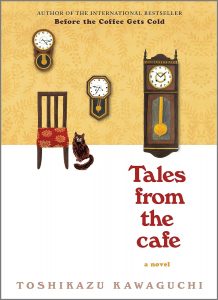 What makes the collection as a whole work is that the remaining stories move the time travel further back and forwards in time, but step by step – or story by story – closer to the cafe’s proprietors and from that sweet possibility of a happy ending to something much closer to the bitterness of the coffee they serve. With just a hint of sugar to help the poignancy to go down.
What makes the collection as a whole work is that the remaining stories move the time travel further back and forwards in time, but step by step – or story by story – closer to the cafe’s proprietors and from that sweet possibility of a happy ending to something much closer to the bitterness of the coffee they serve. With just a hint of sugar to help the poignancy to go down.
These are comfort reads, in the sense that each story’s resolution, even if it isn’t exactly happy, provides the relief of closure, the possibility of change and a sense of catharsis and resolution. The stories are each charming and lovely in their own right and make a surprisingly harmonious whole.
I needed just this kind of comfort read this week and this ‘sad fluff’ book filled that niche perfectly. I’ll certainly be back for the next book in the series, Tales from the Cafe, the next time I have a taste for something just the right side of bittersweet.

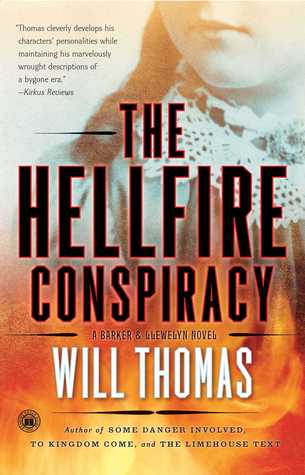 The Hellfire Conspiracy (Barker & Llewelyn, #4) by
The Hellfire Conspiracy (Barker & Llewelyn, #4) by 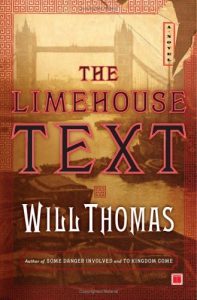 This fourth entry in the marvelously absorbing
This fourth entry in the marvelously absorbing 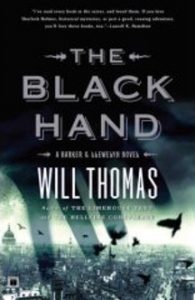 But it’s the characters of Cyrus Barker and Thomas Llewelyn themselves that keep the reader turning pages. Especially in a case like this one, where they go in knowing that the odds of a happy ending are very much against them, but determined to bring as much justice as can be had to all the victims of this atrocity; the living and the dead.
But it’s the characters of Cyrus Barker and Thomas Llewelyn themselves that keep the reader turning pages. Especially in a case like this one, where they go in knowing that the odds of a happy ending are very much against them, but determined to bring as much justice as can be had to all the victims of this atrocity; the living and the dead.










 The Graveyard of the Hesperides (Flavia Albia Mystery, #4) by
The Graveyard of the Hesperides (Flavia Albia Mystery, #4) by  No matter how much technology advances, human nature remains pretty much the same, and that’s a big part of what makes historical mysteries so much fun AND so absorbing. That’s especially true in the
No matter how much technology advances, human nature remains pretty much the same, and that’s a big part of what makes historical mysteries so much fun AND so absorbing. That’s especially true in the 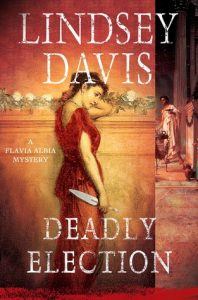 In other words, I came into this book with a whole lot of nostalgia and more than a bit of mystery reading background and baggage crowding my thoughts and falling out a bit willy-nilly all over the place. After all, it’s been nearly two years since I last visited Flavia Albia and her family in
In other words, I came into this book with a whole lot of nostalgia and more than a bit of mystery reading background and baggage crowding my thoughts and falling out a bit willy-nilly all over the place. After all, it’s been nearly two years since I last visited Flavia Albia and her family in  Even as she is in the midst of her own wedding and the hope of future happiness that it brings. If she can just manage to solve this case and get her in-laws out of her own and her formidable mother’s hair before someone’s face gets shoved into fist. Quite possibly her father’s.
Even as she is in the midst of her own wedding and the hope of future happiness that it brings. If she can just manage to solve this case and get her in-laws out of her own and her formidable mother’s hair before someone’s face gets shoved into fist. Quite possibly her father’s.

 Current Giveaways:
Current Giveaways: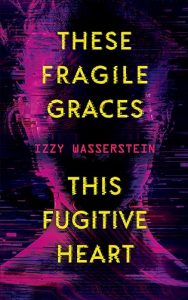 Blog Recap:
Blog Recap: Coming This Week:
Coming This Week:




















 The Mystery Writer by
The Mystery Writer by  Escape Rating B-: I picked this up because I LOVED the author’s previous book,
Escape Rating B-: I picked this up because I LOVED the author’s previous book, 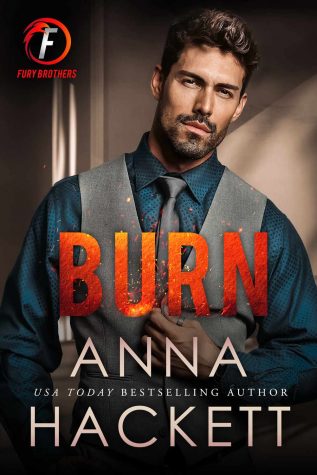 Burn (Fury Brothers #3) by
Burn (Fury Brothers #3) by  As this third entry in the
As this third entry in the  Like the first two books,
Like the first two books, 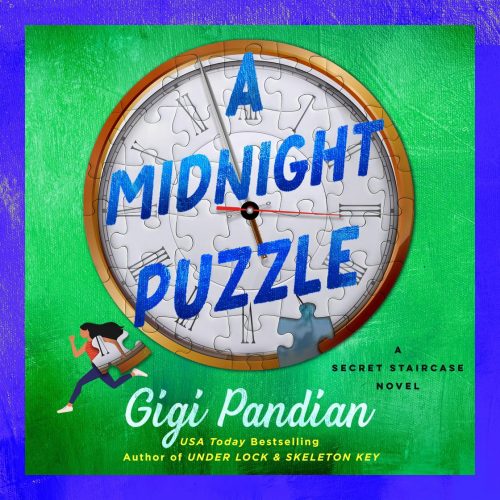 A Midnight Puzzle (Secret Staircase Mystery, #3) by
A Midnight Puzzle (Secret Staircase Mystery, #3) by 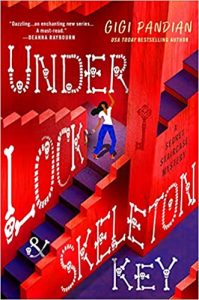 After her adventures – and misadventures – in the first two books in the
After her adventures – and misadventures – in the first two books in the  Escape Rating B: I have to admit that I went into this third entry in the series with a bit of trepidation after the muddle of
Escape Rating B: I have to admit that I went into this third entry in the series with a bit of trepidation after the muddle of 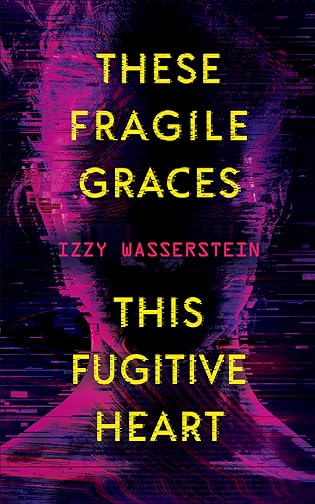 These Fragile Graces, This Fugitive Heart by
These Fragile Graces, This Fugitive Heart by 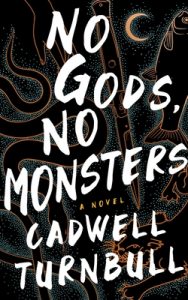 I also would have loved a bit more about the anarchist and commune movement as it applied to this particular story, because I was basing all of my knowledge and acceptance of the way that part of their world worked on Cadwell Turnbull’s fantastic
I also would have loved a bit more about the anarchist and commune movement as it applied to this particular story, because I was basing all of my knowledge and acceptance of the way that part of their world worked on Cadwell Turnbull’s fantastic